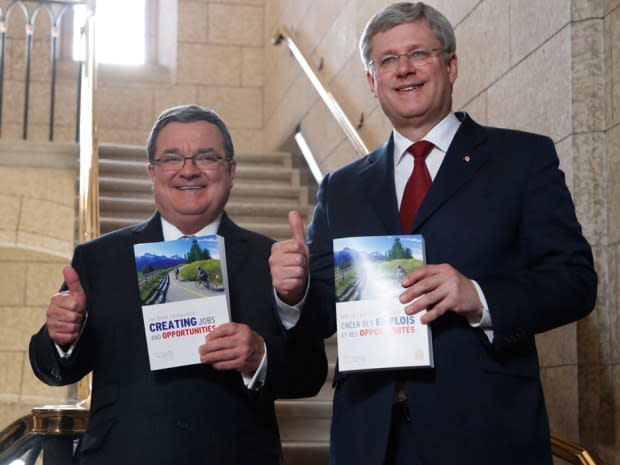 Canada Politics
Canada PoliticsTen highlights of federal Budget 2014

Well before Finance Minister Jim Flaherty tabled his budget, on Tuesday afternoon, it was given many nicknames: the 'do nothing budget' and the 'stay-the-course budget' seemed to be the two most prominent terms pundits used.
The pundits were right. For the most part, Economic Action Plan 2014 was pretty bland.
There are, however, some new measure and some surprises.
Here are ten highlights from the document which can be seen, in full, here.
1. $305 million for high-speed Internet in rural and northern Canada
Flaherty announced that the government will invest more than $300 million to improve or expand high-speed internet for 280,000 homes in rural and northern Canada.
Reports have suggested that 15 per cent of rural communities still lack access to broadband thanks mainly to internet providers steering away from communities in the north.
2. New infrastructure spending
The government recycled some old announcement about infrastructure spending, but new spending includes an additional $470-million towards the Windsor - Detroit bridge.
There's also an additional $237 million for repairs on the Champlain Bridge.
Infrastructure spending has been a primary issue for Canada's mayors in recent years.
According to the Federation of Canadian Municipalities, Canadian cities have an existing infrastructure deficit of $171 billion and new infrastructure gap of at least $113 billion. The immediate needs include upgrades to roads and bridges ($91.1 billion), waste management systems ($39 billion) and wastewater and storm water systems ($15.8 billion).
3. Cigarette tax hikes
The government will increase federal tobacco levies amounting to a tax hike of roughly $4 per carton. Any future hikes will now be tied to inflation.
The government predicts that the tax increase will result in $685-million in new revenues in fiscal year 2014-15.
4. More money for food safety
EAP14 promises $390-million over five years to strengthen Canada's food safety program.
The money will support the hiring of 200 additional inspectors, establish a new federal database and other improvements to the food safety program.
The new funding comes just months after a scathing Auditor General's report which suggested that the Canadian Food and Inspection Agency "did not adequately follow up" with recalling companies once a recall was announced.
5. Tackling unemployment
As explained by the Postmedia News, Ottawa announced a bevy of job creation measures.
They include:
- $40 million to help business entrepreneurs create new companies;
- $75 million over three years to assist unemployed older workers;
- $15 million over three years to help employ people with developmental disabilities;
- and $11.8 million over two years for a “job matching service” that helps connect people with available work in their area.
They're also introducing a $40 million program to provide 3,000 full-time paid internships for post-secondary graduates in "high-demand" fields over the next two years.
6. $500 million for the auto industry
The federal government offering-up $500 million for Canadian automakers as a means to keep jobs in Canada and particularly the province of Ontario.
These funds are in addition to Conservative government's Automotive Innovation Fund - a $250 million fund set-up in 2008 to help the Canada's automotive industry become more innovative and competitive.
As a potential offset of those costs, Flaherty announced the governments plans to sell its shares in General Motors – that could potentially raise upwards of $2.6-billion.
7. Cancellation of the immigrant investor program
The government will cancel Canada's Immigrant Investor Program (IIP) and replace it with an immigrant investor venture capital fund pilot project.
Up until 2012, the IIP offered 2,500 visas a year to affluent foreign nationals — mostly from China — who simply invested $800,000 into Canadian government coffers for a period of 5 years.
The popular program, however, was suspended in July 2012 due to excessive processing backlogs.
8. Senators cannot accrue pensions while suspended
What some are dubbing as the 'Brazeau, Duffy and Wallin rule', the government promises to introduce legislation to prohibit MPs and Senators from "accruing pensionable service as a result of having been suspended from Parliament."
This issue surfaced when Senators Patrick Brazeau, Mike Duffy and Pamela Wallin were suspended from the red chamber last fall. They each served five years in the Senate but can only earn a pension after serving six years.
9. $1.6 billion for science research and innovation
One of the biggest line items in the budget is for science research and innovation.
A big chunk of that includes $1.5 billion — over the next ten years — for post secondary institutions that "excel globally in research areas that create long-term economic advantages for Canada."
10. Laying the groundwork for a surplus in 2015
In this budget, the government is projecting revenues of $276.3 billion and expenses of $279.2 billion and a contingency fund of just of about $3 billion.
Flaherty said he expects to go into the black in 2015 with a $6.4 billion surplus.
(Photo courtesy of the Canadian Press)
Are you a politics junkie?
Follow @politicalpoints on Twitter!


